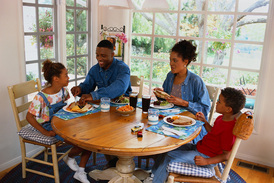|
Life with children is infused with change. School-age children have a full schedule with school and various extra-curricular activities but still have plenty of free time on their hands. What constructive activities will you encourage your child/children to do during that time? Watch television? Surf the Internet? Spend a few hours playing Playstation 4? Will you suggest an activity that that involves being creative, thinking critically, and face to face interaction? Here is a game to help your child make the most of their free time while challenging their creativity, imagination, thinking and social skills, and much more!
Shuffleboard Materials: 4 or 5 flat circular, unbreakable objects (e.g. checkers, milk jug lids) Ruler Directions: 1. Player seat themselves at the edge of a table (without a table cloth) with the circular, unbreakable objects (best if all of them are the same) 2. Players take turns (can be predetermined) sliding the objects one at a time toward the opposite end of the table without them going over the edge. 3. Points are awarded as follows: 1 point: within 6 inches of the edge 2 points: within 1 inch of the edge 3 points: touching the edge 4 points: hanging over the edge How many points can you win in five attempts? Give it a try against a friend, sibling, parent to see who can accumulate the most points!
0 Comments
Almost everyone dislikes conflict. In fact, most people try to avoid it if possible. However, it is very important that children of all ages (and adults) develop conflict resolution skills. Understanding when they are involved in conflict and how to effectively handle the situation can help improve relationships, increase understanding, and reduce tension between individuals. Below are eight ways to effectively manage a conflict situation.
“I’m sorry that you are hurt. That was not my intent.” “I hear you.” “You have a compelling perspective. Let me think about that.”
Parents be sure to "connect" with your child/children instead of just talking to them. One of the best and easiest places to do this is during mealtime. It is an excellent way to get families together to share their experiences for the day, discuss values, and learn more about each other. Eating together on a regular basis can prove to be one of the most important things a family can do to build healthy communication with each other. Here are some tips on how to accomplish that goal:
1. Be available as often as possible- Everyone has a busy schedule (especially during the school year), but make sure to designate time (even if it is only ten minutes) to talk, without distraction from televisions, phones, etc. Give your full attention to your child. 2. Be a good, active listener- If you are unclear about what your child is saying, ask for clarification. You don't have to agree with what is being said. Provide your ideas and/or opinions then decide the best course of action to come to a resolution. 3. Show empathy- Be mindful of your child's feelings. This lets he/she know that you care and understand them at a deeper level and are not minimizing their feelings. 4. Be a positive role model- This is one of the most influential things you can do. As they say, "Actions speak louder than words." Children learn by what they see and as a parent they see you more often than most other adults in their lives. Some additional tips:
|
AuthorRandy Sally Archives
June 2023
Categories
All
|




 RSS Feed
RSS Feed
